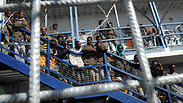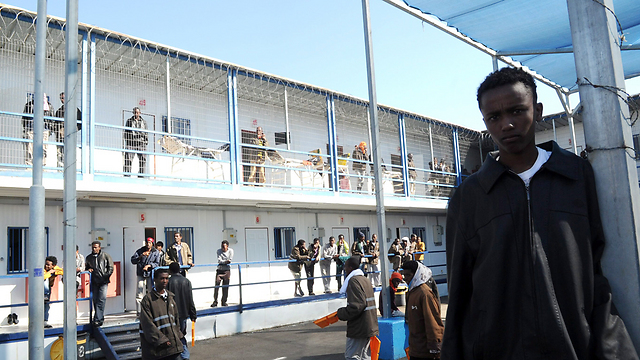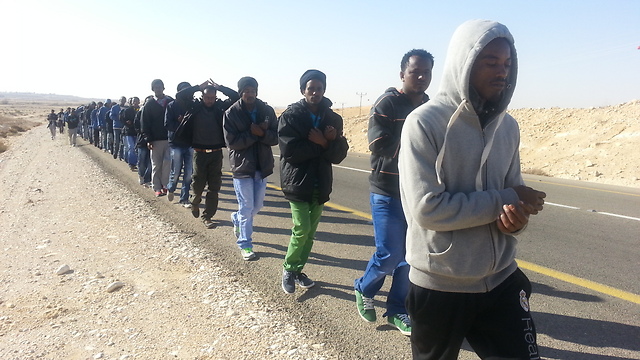
Report reveals poor living conditions in Saharonim detention facility
Israel Bar Association finds asylum seekers in southern detention facility are held in prison-like regime in crammed living spaces, no basic vaccines for infants, some cells without toilets
An official inspection report issued by the Israel Bar Association reveals evidence of harsh living conditions in Saharonim prison in south Israel. Bureau officials present a grim picture regarding the operation of the facility, protection of the detainees' rights, child care, medical system and social care.
The Saharonim facility, used to detain infiltrators, is the largest of its kind in Israel. While the inspection was conducted, men, women and children – all African, mostly Eritrean or Sudanese, were held there. Among the migrants detained in the facility are infiltrators, victims of human trafficking and victims of torture and sexual offences.
Related stories:
- Asylum seekers' battle continues; refugees announce protest
- 773 asylum seekers left Israel in January
- Asylum seekers report for transfer: We don't know where we're going
The authors of the report are attorneys Rachela Arel, Shelly Vaknin Adam and Oded Feller, who heads the immigration and status division at the Association for Human Rights in Israel, who were all appointed by Public Security Minister Yitzhak Aharonovitz.
According to the report, the living space for each detainee is smaller than that specified in the official standard, and the facility does not include almost any of the public functions that were decided upon in the standard. Despite the amendment to the law that requires the prolonged detention of the infiltrators, the authors of the report noted that no adjustments were made to the facility itself.
With no instruction book regarding prolonged detention, a prison routine is conducted in the center, with standard Israeli Prison Service (IPS) discipline to go along with it: The wings are locked, attendance counts are conducted three times a day, and the detainees are not permitted to go to other areas in the facility unless accompanied.
The report further shows that in some cases, the asylum seekers are tried and sent to isolation for up to a week at a time. In the 14th wing, designated for punishment, they are locked up in cells at all times of the day, apart from an hour and a half in the morning and an hour and a half in the afternoon.
Facility not equipped to treat kids
At the time of the inspection, children up to the age of 12, including infants, were held at the facility. A complaint that came up several times in the report was that there are not enough milk substitutes to feed the infants. Although a pediatrician did visit the facility twice a week, the infants did not receive vaccines or vitamins, and no development-tracking or instruction for parents was conducted, according to the report.
The head of the facility said that the issue of childcare will be regulated in the future. "The facility was not equipped for childcare, and children should not be held there," the report says.
Despite the fierce cold felt at the area during nights, the only wing in which heating is provided is that in which the mothers and children reside. No wing is equipped for a prolonged stay, or for the hot weather during the day. The showers and toilets are located in caravans.
The report also notes that the construction of the facility was not accompanied by an outline plan and no building permits were given. In one of the wings, detainees live in tents, with 16 crammed beds in each tent. In a different area titled Saharonim B, the cells do not include toilets.
In conversations with the authors of the report, the asylum seekers said that their complaints are not given sufficient weight. Most of them are dealing with severe mental distress due to their prolonged detention, and those who suffered from experiences of captivity, torture and sexual offenses show post-traumatic symptoms. The detainees shared with the inspectors their feelings of deep despair and lack of hope.
IPS: Report is biased, incorrect
The report cited that the IPS disapproved of the official inspection, and even moved to constrict their actions. It is to be mentioned that in the past two and a half years, the IPS did not allow journalists or media workers to visit the facility.
IPS officials told Ynet that "some of the claims put forth are incorrect and inaccurate," and said that childcare include transportation services to family health care centers, the testing of their development-tracking and a pediatrician on call.
An official report from the IPS said: "The Bar Association report was concluded in May 2013. Ever since, partly due to a change in legislation on the matter, the infiltrators conditions of detention have changed beyond recognition."
They further added that they only received the report seven months after it was conducted and they do not intend to take into account the deficiencies cited there as they are no longer relevant.
Omri Efraim contributed to this report












